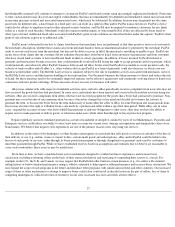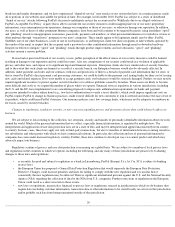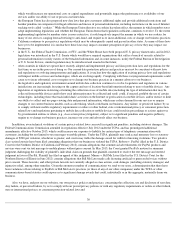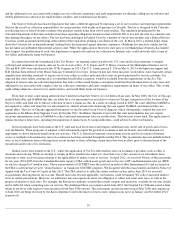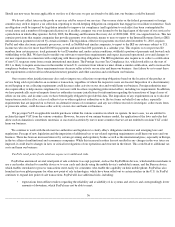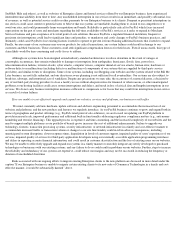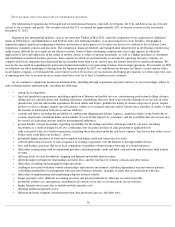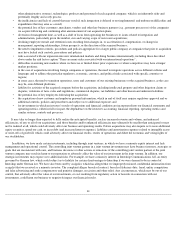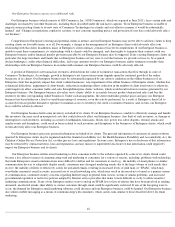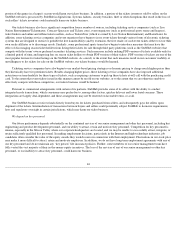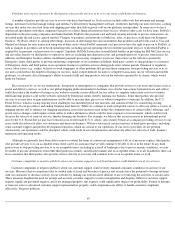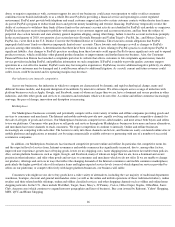eBay 2013 Annual Report Download - page 39
Download and view the complete annual report
Please find page 39 of the 2013 eBay annual report below. You can navigate through the pages in the report by either clicking on the pages listed below, or by using the keyword search tool below to find specific information within the annual report.
Unless we are able to successfully manage these risks, including driving adoption of, and significant volume through, our retail point of
sale solutions over time, our business may suffer.
Changes in PayPal's funding mix could adversely affect PayPal's results.
PayPal pays significant transaction fees when customers fund payment transactions using credit cards, lower fees when customers fund
payments with debit cards, nominal fees when customers fund payment transactions by electronic transfer of funds from bank accounts, and no
fees when customers fund payment transactions from an existing PayPal account balance or through the Bill Me Later service, or use buyer
credit issued by GE Money Bank. Customers fund a significant portion of PayPal's payment volume using credit and debit cards, and PayPal's
financial success is highly sensitive to changes in the rate at which its customers fund payments using credit and debit cards. Customers may
prefer funding payment transactions using credit cards or debit cards rather than bank account transfers for a number of reasons, including the
ability to dispute and reverse charges directly with their payment card provider if merchandise is not delivered or is not as described, the ability
to earn frequent flier miles, cash rebates, or other incentives offered by payment card issuers, the ability to defer payment, or a reluctance to
provide bank account information to PayPal. In addition, some of PayPal's offerings, including the ability for buyers to make a limited number of
"guest" payments without opening a PayPal account, have a higher rate of payment card funding than PayPal's basic product offering. Further,
some of PayPal's plans to lower its funding costs, including both the Bill Me Later credit products and service and the ability for buyers to defer
payment for a short period of time on some transactions, may increase the risk to PayPal of nonpayment by buyers. If we experience an increase
in fees associated with our funding mix or in losses associated with nonpayment by buyers, our business and financial results could suffer.
PayPal's failure to manage customer funds properly could harm its business.
PayPal's ability to manage and account accurately for customer funds requires a high level of internal controls. In some of the markets that
PayPal serves and currencies that PayPal offers, PayPal has a limited operating history and limited experience in managing these internal
controls. As PayPal's business continues to grow, it must continue to strengthen its internal controls accordingly. PayPal's success requires
significant public confidence in its ability to handle large and growing transaction volumes and amounts of customer funds. Any failure to
maintain necessary controls or to manage customer funds accurately could severely diminish customer use of PayPal's products and/or result in
penalties and fines, which could have an adverse effect on our business and financial results.
Systems failures and resulting interruptions in the availability of our websites, applications, products or services could harm our business.
We have experienced system failures from time to time, and any interruption in the availability of our websites, applications, products or
services will reduce our current revenues and profits, could harm our future revenues and profits and could subject us to regulatory scrutiny. Our
eBay.com website has been interrupted for periods of up to 22 hours. In August 2013, technical issues affected several of our websites resulting
in intermittent outages over a period of just over six hours, and in April 2012, technical systems issues resulted in eBay.com users being unable
to checkout on our sites for a period of several hours. Our PayPal website has suffered intermittent unavailability for periods as long as five days,
including unavailability for approximately three hours affecting payments primarily on our ebay.co.uk site in May 2011. Other of our websites
(e.g.,
37
•
PayPal's retail point of sale solutions may be targeted by fraudsters and given that our fraud models are less developed in this area,
we may experience increases in fraud and associated transaction losses as we adjust to fraudulent activity at the point of sale:
• the manufacturing and sale of hardware products (e.g., the PayPal Here devices and the Beacon device) exposes us to potential
product liability claims for which we could have substantial liability, and could require product recalls or other actions;
• PayPal's point of sale solutions also may subject us to increased exposure to other laws and regulations (e.g., export control
regulations related to the shipment of the PayPal Here reader across national borders);
• PayPal's continued expansion into point of sale transactions is dependent, in part, upon cooperation with third parties, including
the processing companies and banks that link PayPal to the payment card and bank clearing networks to process transactions. If
we are unable to maintain these relationships or enter into new agreements for necessary services on acceptable terms, our ability
to expand our presence at the point of sale could be harmed;
• significant competition at the retail point of sale, and there can be no assurance that merchants will adopt, or consumers will use,
PayPal's retail point of sale solutions; and
•
lower profit margins than PayPal's other payment solutions.


